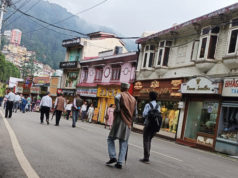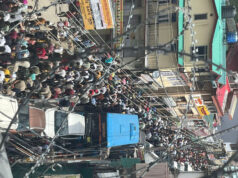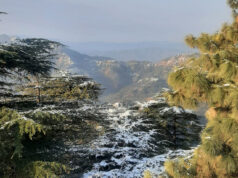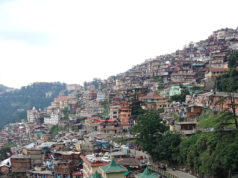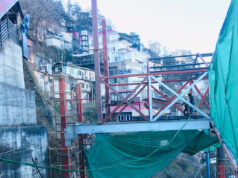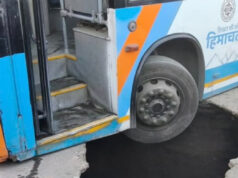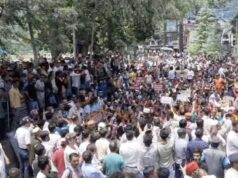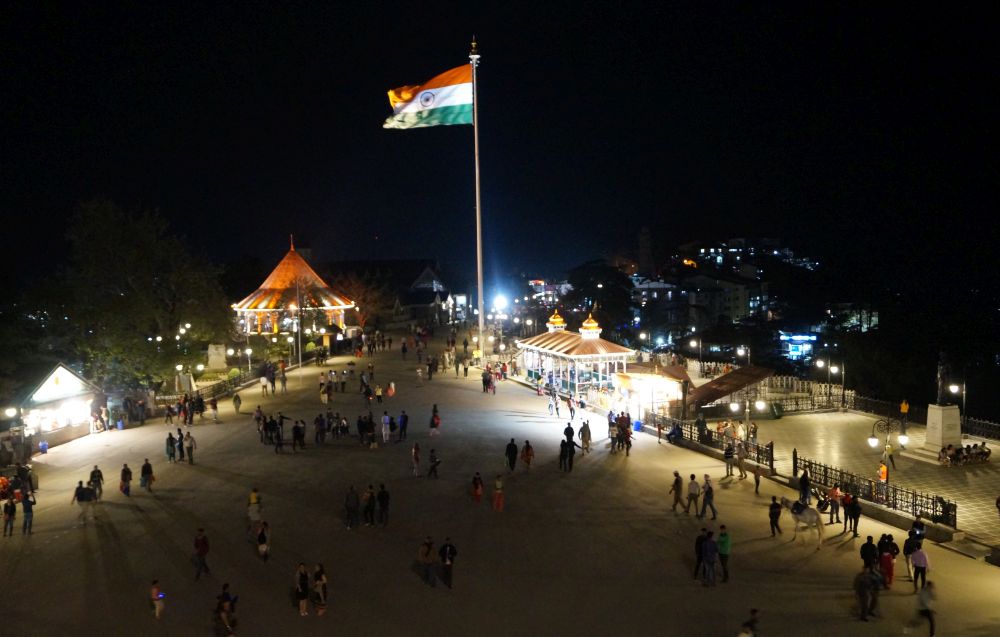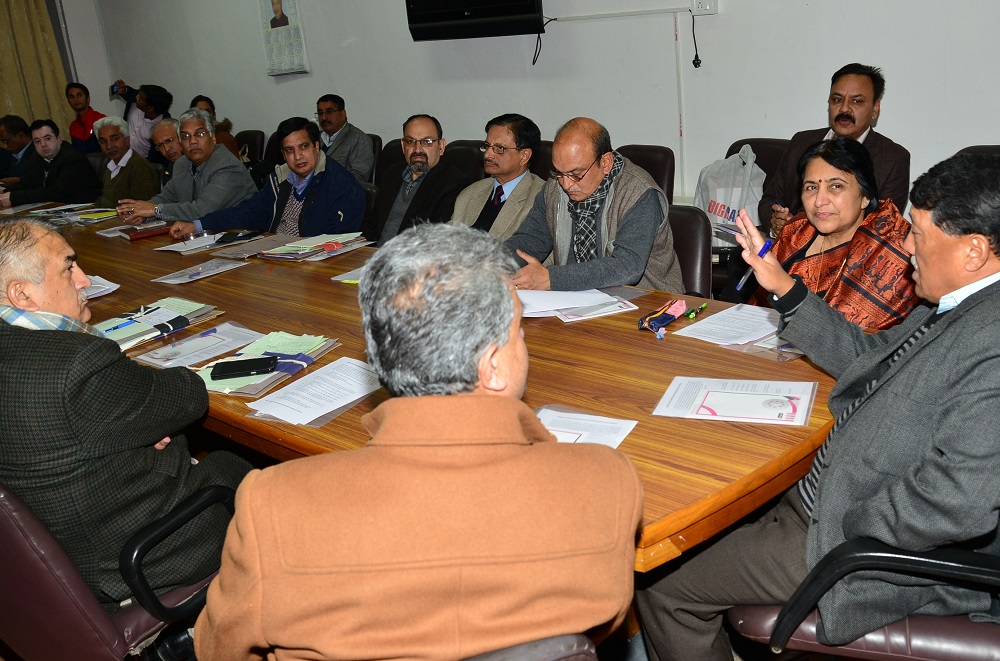Aiming to prevent further degradation of the historic Shimla city, the National Green Tribunal (NGT) has prohibit new construction of any kind, i.e. residential, institutional and in any part of the Core and Green/Forest area of the city.
A NGT bench of Justice Swatanter Kumar, while disposing of a petition filed by an environmentalist, Yogendra Mohan Sengupta, ordered “No construction of any kind, i.e. residential, commercial, institutional or otherwise would be permitted within three meters from the end of the road/national highways in the entire State of HP, particularly, in Shimla Planning Area.” The bench also directed all the concerned authorities to duly enforce the regulation strictly.
It restrained the Himachal government and its departments from cutting hills and forests without prior submission of application for sanctioning of plans for construction. Court ruled
“If any person is found to be damaging Forest/Green area and/or cutting of hills, without grant of permission of the concerned authorities and without construction plan being sanctioned, he/she would be liable to pay environmental compensation as may be determined by the concerned department but not less than Rs. 5 Lakhs for each violation. The compensation, if not paid, shall be recovered as land revenue by the State and will be utilized by the State for restorative purposes and/or for afforestation of the Shimla Planning Area.”
NGT rebuked the state government for allowing indiscriminate construction, and said it has failed to discharge its constitutional obligations and it was this failure that has exposed picturesque Shimla to natural and man-made disasters. Court observed
“If such unplanned and indiscriminate development is permitted, there will be irreparable loss and damage to the environment, ecology and natural resources on the one hand and inevitable disaster on the other,”
Action Plan
The NGT ordered the state government to prepare an Action Plan within three months for providing appropriate infrastructure, water and sewerage facilities, roads, greenery, other public amenities and retrofitting of existing structures (especially public utilities) particularly with the earthquake resistance structures in the areas which have been indiscriminately developed and lacks such facilities like Sanjauli and other congested areas of Shimla including Lower Bazar etc.
Rain water harvesting
The NGT issued directive to make Rain water harvesting mandatory requirement for all the building plans. Even the old buildings where such Rain water harvesting structures are not present must be provided with RWH systems within three months. This direction must be complied with particularly in relation to public buildings, schools, colleges, universities, hotels, hostels, etc.
Proper Channelization of rain water from raods
All the storm water available as surface run off in all the concretised areas like roads, lanes, platforms and market places should be diverted in such a manner to ensure that such run off does not go in to over burden or flow along hills and depressions, thereby creating over saturation and affecting soil and slope stability. Options be evaluated for storage and use of such water after proper treatment/disinfection.
Complete Ban on felling of trees in Catchment Forest of water streams
The Green Bench also ordered for a complete ban on felling of trees in Catchment Forest and Sub-Catchment of water streams and water sources. In such areas, even change of land use to horticulture and agriculture should not be permitted as that can add pesticides and inorganic chemicals to soil which will eventually drain in to water sources.
Complete Ban on Plastic
The NGT ordered to reaffirmed the ban on use of plastic bags and plastic packaging in the Shimla Planning Area, and ordered the State of HP, it’s Departments, Himachal State Pollution Control Board and the Municipal Corporation of Shimla to ensure that no plastic bags or plastic packing or goods are be used, stored, sold and/or given with any product, by the shopkeepers in the Shimla Planning Area.
The Green Court also ordered the State Government to manage the waste generated in the Shimla Planning Area strictly in consonance with the Solid Waste Management Rules, 2016.
“The Waste to Energy Plant located at Bhariyal should positively be made operational as directed by the Tribunal in the other connected matters by 15th November, 2017.” The Court further ordered.
The Green court ordered the constitution of a ‘High Powered Expert Committee’ to maintain a check on any violations henceforth.
The Green Court also ordered to appoint the Committee to be termed as ‘High Powered Expert Committee’, which shall be responsible for carrying out the specific directions under this judgement and provide NOC or other necessary permissions to the stakeholders, whether State or private parties.
The Committee shall also ensure no further degradation of environment, ecology and natural resources of the Shimla Planning Area. If anything comes to the notice of this Committee, they would be at liberty to move to the Tribunal for appropriate directions. The High Powered Expert Committee shall consist of two components. First would be the Supervisory Committee while the later would be Implementation Committee.
I. SUPERVISORY COMMITTEE:
i) Secretary, Urban Development, State of Himachal Pradesh.
ii) Director, Wadia Institute of Himalayan Geology, Dehradun.
iii) Director, Town and Country Planning, Govt. of H.P. shall be the Member Secretary of the Committee
iv) Professor from relevant field nominated by the Director, Punjab Engineering College, Chandigarh.
v) Nominated officer from NDMA not below the rank or equivalent to the Joint Secretary or above.
vi) Member Secretary, H.P. Pollution Control Board.
II. IMPLEMENTATION COMMITTEE:
Chairman: Director, Deptt. Town and Country Planning, Govt. of H.P.
MEMBERS:
i) State Town Planner, Govt. of H.P.
ii) Director, Department of Urban Development, Govt. of H.P.
iii) Municipal Commissioner, Shimla
iv) Nominated officer from Wadia Institute of Himalayan
Geology, Dehradun not below the rank or equivalent to Director in Govt. of India.
v) Nominated officer from NDMA not below the rank or equivalent to Director in Govt. Of India.
vi) State Geologist, Department of Industries, Govt. of H.P.
vii) Director, Department of Environment, Science &
Technology, H.P.
viii) Architect in-Chief, H.P. PWD.
ix) Member Secretary, H.P. Pollution Control Board.
The Supervisory Committee shall meet atleast once in three months, while the Implementation Committee shall meet every month in the first week to perform the functions and duties assigned to them under this judgement, without default.
The Green Bench ordered the High Powered Expert Committee to carry out a survey of lifeline structures and identify those structures that are vulnerable to damage due to seismic events and other natural hazards. Also it will identify and delineate passages for providing emergency services, for medical assistance and relief works, so that enough openings are created for ingress and egress of fire tenders and emergency medical vehicles/ ambulances. XIX, bench further ruled.
The Committee shall also advise the State of HP for regulating traffic on all roads, declaring prohibited zones for vehicular traffic, preventing and controlling pollution and for management of Municipal Solid Waste in the Shimla Planning Area. The recommendation of this Committee should be carried out by the State Government and all its departments as well as local authorities, without default and delay.


